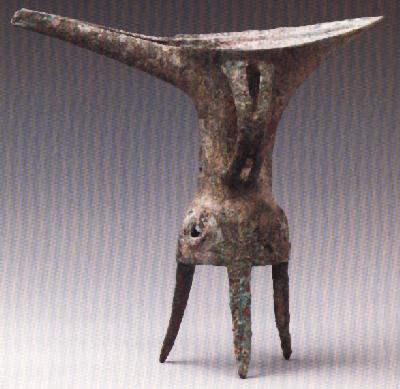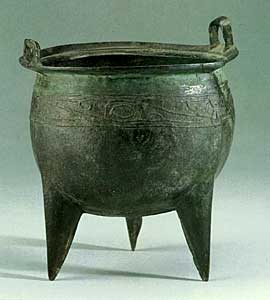 |
| Bronze Jue (a wine vessel) (22.5 cm
high) |
As the first slave dynasty in Chinese history,
the Xia Dynasty (21st-16th century BC) began with the reign of Qi, the son of
the Great Yu, and ended with the fall of Jie. With its capital located in Anyi
(north of Xia County in mid-west Shanxi Province), the Xia was ruled by the
descents of the Xiahou tribe. Altogether, there were 16 kings in 13
generations.
 |
| Ding (a container to store food) with cloud
patterns |
Formed on an alliance of a dozen closely
related tribes led by the Xiahou tribe, the Xia Dynasty carried out a system of
hereditary monarchy and nobility. Noble organizations at different levels kept
their original consanguinity and were strictly restricted to different surnames.
The king of the Xia practiced enfeoffment on lords. With the patriarchy clan at
the core of the social system, the nobles were divided into different levels
according to positions in the family hierarchy and close or distant
relationships between clans.
 |
| Square tomahawk with cross
patterns |
The Xia established its own army and penal
code Yu Xing (penal code of Yu). The Xia also created a calendar, which
is said to be China's first calendar, using the Big Dipper to determine months.
Xia Xiao Zheng, kept in
Da Dai Li Ji (Book of Rites by Da Dai), is an important existing
document of the Xia calendar. It recorded the movements of the sun, moon and
stars in line with the 12 lunar months of the year and also the seasons of
stockbreeding and farming accordingly. Xia Xia
Zheng, to certain extent, reflects
the development of animal husbandry and agriculture in Xia, leaving an
invaluable record of the earliest scientific knowledge in ancient
China.
